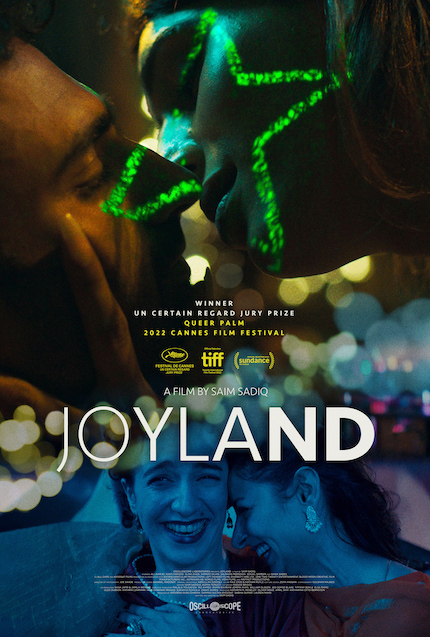JOYLAND Review: Finding Your True, Authentic Self
Saim Sadiq wrote and directed the winner of the "Best International Film" award at the 2023 Film Independent Spirit Awards. Ali Junejo, Ali Junejo and Alina Khan star.

Writer-director Sam Sadiq’s feature-length debut, Joyland, is a film of firsts.
It's the first Pakistani film to debut at Cannes (last year), where it won the Un Certain Regard and Queer Palm awards; the first Pakistani film to be shortlisted for this year’s Academy Awards in the Best International Feature Film; and the first queer-themed film to receive approval for release in Pakistan, making it eligible for the 2023 Academy Awards, only for that approval to be rescinded two days before its scheduled release in Sadiq's native Pakistan.
The film’s central message -- promoting tolerance for non-traditional gender roles, sexual/gender identity, and finding your true, authentic self -- ran afoul of Pakistan’s ultra-conservative censorship board, essentially proving why Sadiq’s film needed to be made in the first place.
Joyland centers primarily on Haider Amanullah (Ali Junejo), a directionless 30-something semi-slacker stuck in an arranged, passionless marriage to Mumtaz (Rasti Farooq), an oppressive family life shaped, defined, and dictated by his ultra-conservative, reactionary patriarch, Rana (Salmaan Peerzada). Where the wheelchair-bound Rana dreams of Haider, his younger son, and Mumtaz giving him the grandson he’s always dreamed about, Haider’s traditionally masculine brother, Saleem (Sohail Sameer), can’t give Rana a grandson. Instead, Saleem has fathered three daughters with a fourth on the way, a reminder of the value patriarchal societies place on men (highly) and women (far less).
While Haider and Mumtaz seem to have a relatively stable marriage based on mutual need and gender-flipped roles where Haider remains in their shared, multi-generational home, acting as part-time caretaker to his brother’s three daughters and caregiver to his sullen, judgmental father, Mumtaz has carved out a measure of autonomy and independence for herself working in a beauty parlor and handling make-up chores for the establishment’s clientele. It’s a relationship that works for Haider and Mumtaz, but given Rana’s constant, unrelenting pressure to procreate and give him a grandson, it’s unlikely to last long-term.
Eventually, it doesn’t, as Haider obtains a well-paying gig as a backup dancer at a local nightclub for a trans performer, Biba (Alina Khan). Suddenly, all of the feelings, emotions, and desires Haider has sidestepped or avoided most of his adult life come into sharp focus.
As Haider falls into the routines and rhythms of working at the nightclub, he starts spending more time with Biba outside business hours, leaving Mumtaz, reliant on his emotional support more than the physical intimacy he fitfully provides her, alone, isolated, and depressed.
Given the social, cultural, and personal obstacles they face as a non-straight couple in contemporary Pakistan, the romance between Haider and Biba seems doomed from the start. Between Haider’s lethargic detachment, indifferent neglect of Mumtaz, and his inability to be honest with himself and others, he falls short of sympathetic character status.
In fact, it can be intensely frustrating watching the passive, reactive Haider stumble from one scene to another, making the least bad decision at any moment only for the accumulation of bad, no-good decisions to return five- or ten-fold during the not unpredictable events contained in the back half of the film.
Despite Haider’s problematic status as a lead character, Joyland shines due to the presence of Mumtaz, Biba, their individual stories, and the inadvertent linkage between the two women. Ultimately, both Mumtaz and Biba emerge as tragic figures, their futures constricted if not outright derailed by the unbearable weight of social and cultural pressures.
As played by Rasti Farooq and Alina Khan, respectively, Mumtaz and Biba, in all their flaws, contradictory impulses, and conflicted desires become the twin reasons for seeking out Joyland whenever it receives a general release theatrically or via streaming stateside.
Originally published during the Sundance Film Festival in January 2023. The film opens Friday, April 7 in New York at Film Forum, where director Saim Sadiq will be in-person for opening weekend Q&As, and then Friday, April 21 in Los Angeles at the Landmark Nuart. Additional cities nationwide will follow. Visit the official site of distributor Oscillope for more information.
Joyland
Director(s)
- Saim Sadiq
Writer(s)
- Saim Sadiq
- Maggie Briggs
Cast
- Ali Junejo
- Rasti Farooq
- Alina Khan







